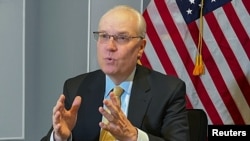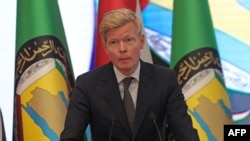With the upcoming Muslim holy month of Ramadan beginning March 22, U.S. Special Envoy to Yemen Tim Lenderking is in Saudi Arabia and Oman this week, aiming to extend the U.N.-mediated truce in the Yemen conflict.
Yemen's internationally recognized government and the Houthi rebels agreed to a truce during Ramadan last year, but it expired in October.
Since his appointment by President Joe Biden in February 2021, Lenderking has made multiple trips to the region, including a visit to Saudi Arabia, Oman and the United Arab Emirates last month. However, this is his first trip following a Chinese-brokered rapprochement deal last week between Saudi Arabia and Iran, backers of the warring parties in Yemen.
Last week, in a deal brokered by Beijing, Riyadh and Tehran announced they had agreed to reestablish diplomatic channels that had been severed since 2016. Despite some observers’ views that Beijing’s ability to mediate a detente between the two archrivals amounted to a sign of receding U.S. influence in the region, White House officials have publicly welcomed the deal. However, they also warned that it remains to be seen whether the agreement will last.
“Saudi Arabia still has a right and a responsibility to defend itself and its citizens,” said John Kirby, National Security Council coordinator for strategic communications, in a briefing to reporters Tuesday. “70,000 of Saudi residents are Americans. And so we share that responsibility, and we'll continue to make sure that Saudi can defend itself.”
The civil war in Yemen began in 2014 when Shiite rebels backed by Iran – known as Houthis – took over the capital, Sanaa. Beginning in March 2015, with support from the Obama administration, a coalition of Persian Gulf states led by Saudi Arabia launched a campaign of economic isolation and airstrikes against the Houthis, in effect turning the conflict into a Sunni-Shiite proxy war between regional powers.
An extension of the Yemen truce will be the first test of the credibility of the Saudi-Iran deal, said Alex Vatanka, director of the Iran program at the Middle East Institute.
“One thing is to have a photo-op, and another thing to actually – for Saudi Arabia and Iran, for example – to sit down and end the Yemen war,” he told VOA.
The White House would not confirm reporting by Saudi media that a truce extension in Yemen is imminent.
Saudi and Iran calculus
The Saudis have sunk hundreds of billions of dollars into the military campaign in Yemen and are keen to de-escalate as they focus on rebranding their country and attracting investors under their Vision 2030 blueprint, said Merissa Khurma, program director of the Middle East Program at the Wilson Center.
“At a time when it's in a really good place, given high oil prices, to invest in implementing its vision for diversification, for investments, they need to deal with it first,” she told VOA.
Meanwhile, with no sign of the Joint Comprehensive Plan of Action deal that suspends Iran’s nuclear program in exchange for sanctions relief being resuscitated anytime soon and Tehran under additional Western sanctions for its treatment of pro-democracy protesters, Khurma said Iranians may feel this is a good time to begin talks to recalibrate its place in the region.
But in reducing tensions, Riyadh and Tehran could not turn to Washington, which has not had diplomatic relations with Iran since 1980. Instead, the Saudis turned to China, which has trade ties and economic clout with both capitals, and in the process allows it to hedge relationships with major powers as the U.S. reduces engagement in the region to focus on propping up Ukraine’s effort to defend itself against Russia’s invasion, Khurma added.
This does not mean relations with Washington will change. Just this week, the White House and U.S. lawmakers applauded an announcement by Boeing that it had secured orders for dozens of 787 Dreamliner jets with two Saudi Arabian airlines.
US withdrawal
Ironically, U.S. withdrawal from the region may also be a factor for Riyadh to make peace with its regional archrival. Particularly, the Saudis have perceived a lack of support from Washington for the Saudi-led coalition in Yemen and an underwhelming U.S. reaction to the 2019 Iranian attacks on Saudi oil facilities.
Things would have been different if the Saudis believed that U.S. leadership in creating a military coalition against Iran was serious, said Vatanka, of the Middle East Institute.
"But if they can’t confront Iran alone without the support of the U.S., then why confront Iran at all?” he asked.
Meanwhile, U.N. Special Envoy on Yemen Hans Grundberg on Wednesday said momentum to end the conflict had been renewed by the Saudi-Iran deal and urged warring sides to “seize the opportunity” to take steps toward peace.
“Intense diplomatic efforts are ongoing at different levels to bring the conflict in Yemen to an end,” Grundberg told the U.N. Security Council. “We are currently witnessing renewed regional diplomatic momentum, as well as a step change in the scope and depth of the discussions.”
The Yemen conflict has claimed nearly half a million lives and is considered to have produced one of the worst humanitarian crises on the planet.
Margaret Besheer contributed to this report.







